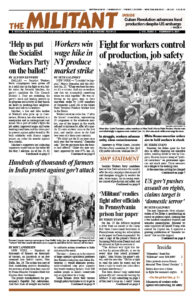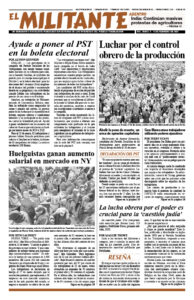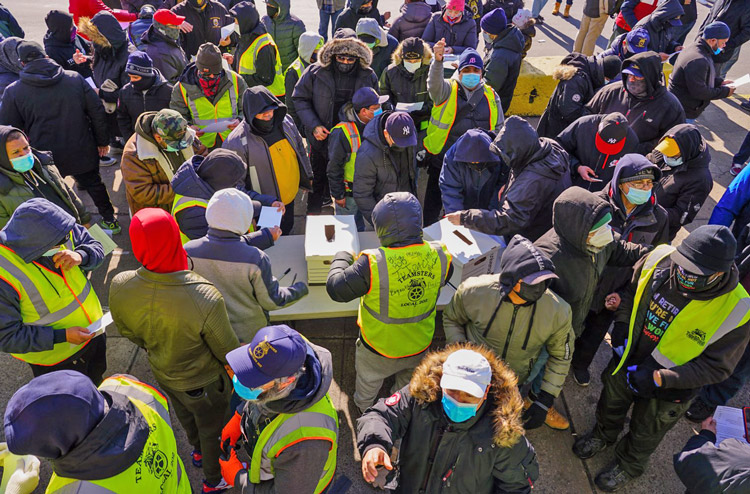NEW YORK — “I couldn’t be happier,” Marco Gonzalez told the Militant Jan. 23. “When you beat the owners it’s a victory. And my co-workers saw that we accomplish something when we stick together.” He was referring to the gains won in their one-week strike by 1,400 members of Teamsters Local 202 at the Hunts Point Terminal Produce Market here in the Bronx.
Workers went on strike Jan. 17 after the bosses’ association, representing 30 companies at the wholesale market, one of the largest in the world, refused to increase its offer of a measly 32-cents-an-hour raise in the first year, and similar raises in the final two years of a three-year contract.
“We didn’t get the $1-an-hour raise each year that we wanted,” Gonzalez said. “But we got more than the bosses had offered.” Under the new contract, approved by over 97% Jan. 23, all workers get a 70-cent raise the first year and 50 cents the second. In the final year of the contract the lowest-paid workers get a 65-cent increase and the highest-paid get a $1,300 bonus instead. Most workers are currently paid an average of between $18 and $21 an hour. Under the new contract, new hires start at $16.75.
The agreement narrows a little the gap between the highest- and lowest-paid workers. “I wished we had never accepted the two tiers about 10 years ago,” Gonzalez said. “The economy wasn’t doing good then and the bosses said they needed some concessions.”
Gonzalez, who has worked more than 20 years at the market, said he was surprised by the solidarity the strike won. “I couldn’t believe it. I thought we were going to be all alone.”
At the picket line Jan. 21, Local 202 President Dan Kane Jr. told strikers and supporters, “We got all kinds of support — including more food than we could possibly eat.” Members of other Teamsters locals and several United Food and Commercial Workers locals came to the picket line, as well as many students and some area politicians.
The bosses tried to maintain production despite the strike, hiring strikebreakers. And some union members crossed the line. “The company offered workers $200 extra a day or more to cross the picket line,” said striker José Lora. But even with that the owners were feeling the impact of the strike. “At one company there were trailers full of produce that was going bad they could not unload,” he said.
Solidarity from workers, farmers
Solidarity increased after cops, some dressed in riot gear, arrested six strikers Jan. 18, charging them with blocking trucks trying to enter the market. Later in the week, workers succeeded without cop interference in slowing down the entry of trucks for 15 minutes to half an hour at a time.
A rail crew on a CSX train pulling cars loaded with produce refused to cross the picket line Jan. 20 and turned back. And a group of farmers from Massachusetts and Rhode Island — whose produce shipments to the market were disrupted by the strike — brought food to the picket line, Lora said.
The Hunts Point Produce Market Cooperative Association issued a statement at the start of the strike implying that union members would lose their jobs. “The Bronx has seen an unemployment rate of 40%,” the bosses said, and argued business was down due to the coronavirus pandemic. They claimed to have spent $3 million on virus protection, although workers say they don’t even give out masks.
The statement made many workers more determined. “I don’t believe the bosses,” Miguel Mejia said on the picket line Jan. 21. “Before the pandemic I was working eight hours a day. Just before the strike I was working 10 hours a day. The bosses can talk about 40% unemployment, but there’s plenty of work in the market.”
Diego Castro, who works at A&J Produce, said, “The strike was 90% effective where I work.” But the number of workers who crossed the picket line at some other companies had an impact, he said. “If we had been more united, we would have won even more.”
Some workers are discussing what they’ve learned in the course of the strike. “It’s unjust that the owners can bring in people to work during the strike, but the police don’t let workers block the trucks,” said Benito Cohate. “The bosses can do what they want, but not us.
“I think a lot of people are getting tired of the politicians and the way the country is being governed,” he said. “They want to see changes.”


